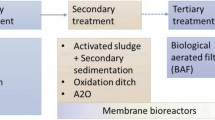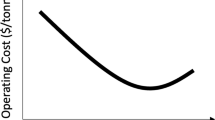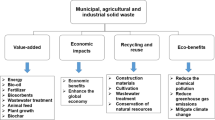Abstract
The paper presents a new approach to support the strategic decision-making in the area of municipal solid waste management applying modern circular economy principles. A robust two-stage integer non-linear program is developed. The primary goal tends to reduce the waste production. The generated waste should be preferably recycled as much as possible and the resultant residual waste might be used for energy recovery. Only some waste residues are appropriate for landfilling. The aim is to propose the near-optimal waste allocation for its suitable processing as well as waste transportation plan at an operational level. In addition, the key strategical decisions on waste treatment facilities location must be made. Since waste production is very often hard to predict, it is modeled as an uncertain decision-dependent quantity. To support the circular economy ideas, advertising and pricing principles are introduced and applied. Due to the size of available real-world data and complexity of the designed program, the presented model is linearized and uncertainty is handled by a robust optimization methodology. The model, data, and algorithm are implemented in MATLAB and Julia, using the state-of-the-art solvers. The computational result is a set of decisions providing a trade-off between the average performance and the immunization against the worst-case conditions.







Similar content being viewed by others
References
Alçada-Almeida L, Coutinho-Rodrigues J, Current J (2009) A multiobjective modeling approach to locating incinerators. Socio-Econ Plann Sci 43:111–120. https://doi.org/10.1016/j.seps.2008.02.008
Allesch A, Brunner PH (2014) Assessment methods for solid waste management: a literature review. Waste Manag Res 32(6):461–473. https://doi.org/10.1177/0734242X14535653
Asefi H, Lim S (2017) A novel multi-dimensional modeling approach to integrated municipal solid waste management. J Clean Prod 166:1131–1143. https://doi.org/10.1016/j.jclepro.2017.08.061
Ben-Tal A, Ghaoui L, Nemirovski A (2009) Robust optimization. Princeton University Press, Princeton
Berglund PG, Kwon C (2014) Robust facility location problem for hazardous waste transportation. Netw Spat Econ 14:91–116. https://doi.org/10.1007/s11067-013-9208-4
Bertsimas D (2014) Statistics and machine learning via a modern optimization lens. (the 2014–2015 philip mccord morse lecture). INFORMS Annual Meeting, pp 1–42
Bing X, Bloemhof J, Ramos T, Barbosa-Póvoa A, Wong C, van der Vorst J (2016) Research challenges in municipal solid waste logistics management. Waste Manag 48(1):584–592. https://doi.org/10.1016/j.wasman.2015.11.025
Bixby R (2012) A brief history of linear and mixed-integer programming computation. Doc Math 19:107–121
Blumenthal K (2011) Generation and treatment of municipal waste. Tech. Rep. KS-SF-11-031, Eurostat, European Commission: Luxembourg City, Luxembourg
Boyd S, Vandenberghe L (2004) Convex optimization. Cambridge University Press, Cambridge
Corsini F, Gusmerotti N, Testa F, Iraldo F (2018) Exploring waste prevention behaviour through empirical research. Waste Manag 79:132–141. https://doi.org/10.1016/j.wasman.2018.07.037
De Jaeger S, Rogge S (2013) Waste pricing policies and cost-efficiency in municipal waste services: the case of flanders. Waste Manag Res 31(7):751–758. https://doi.org/10.1177/0734242X13484189
Dias J, Captivo M, Cliímaco J (2008) A dynamic location problem with maximum decreasing capacities. Cent Eur J Oper Res 16(3):251–280. https://doi.org/10.1007/s10100-008-0055-1
Dunning I, Huchette J, Lubin M (2017) Jump: a modeling language for mathematical optimization. SIAM Rev 59(2):295–320. https://doi.org/10.1137/15M1020575
Eiselt H, Marianov V (2014) A bi-objective model for the location of landfills for municipal solid waste. Eur J Oper Res 235:187–194. https://doi.org/10.1016/j.ejor.2013.10.005
Eiselt H, Marianov V (2015) Location modeling for municipal solid waste facilities. Comput Oper Res 62:305–315. https://doi.org/10.1016/j.cor.2014.05.003
EPRS (2016) European parliamentary research service: circular economy package, online. URL http://www.europarl.europa.eu/EPRS/EPRS-Briefing-573936-Circular-economy-package-FINAL.pdf
Gambella C, Maggioni F, Vigo D (2018) A stochastic programming model for a tactical solid waste management problem. Eur J Oper Res. https://doi.org/10.1016/j.ejor.2018.08.005 in press
Geissdoerfer M, Morioka S, Carvalho M, Evans S (2018) Business models and supply chains for the circular economy. J Clean Prod 190:712–721. https://doi.org/10.1016/j.jclepro.2018.04.159
Ghiani G, Lagana D, Manni E, Musmanno R, Vigo D (2014) Operations research in solid waste management: a survey of strategic and tactical issues. Comput Oper Res 44:22–32. https://doi.org/10.1016/j.cor.2013.10.006
Grant M, Boyd S (2008) Graph implementations for nonsmooth convex programs. In: Blondel V, Boyd S, Kimura H (eds) Recent advances in learning and control, Lecture notes in control and information sciences. Springer, Berlin, pp 95–110
Gulpinar N, Pachamanova D, Canakoglu E (2013) Robust strategies for facility location under uncertainty. Eur J Oper Res 225:21–35. https://doi.org/10.1016/j.ejor.2012.08.004
Gurobi Optimization I (2016) Gurobi optimizer reference manual. URL http://www.gurobi.com
Hrabec D, Haugen K, Popela P (2017) The newsvendor problem with advertising: an overview with extensions. Rev Manag Sci 11(4):767–787. https://doi.org/10.1007/s11846-016-0204-1
Hu C, Liu X, Lu J (2017) A bi-objective two-stage robust location model for waste-to-energy facilities under uncertainty. Decis Support Syst 99:37–50. https://doi.org/10.1016/j.dss.2017.05.009
Inghels D, Dullaert W, Vigo D (2016) A service network design model for multimodal municipal solid waste transport. Eur J Oper Res 254:68–79. https://doi.org/10.1016/j.ejor.2016.03.036
Khouja M, Robbins SS (2003) Linking advertising and quantity decisions in the single-period inventory model. Int J Prod Econ 86:93–105. https://doi.org/10.1016/S0925-5273(03)00008-2
Lam H, Ng W, Ng R, Ng E, Aziz M, Ng D (2013) Green strategy for sustainable waste-to-energy supply chain. Energy 57:4–16. https://doi.org/10.1016/j.energy.2013.01.032
Martin J, Koralewska R, Wohlleben A (2015) Advanced solutions in combustion-based WtE technologies. Waste Manag 37:147–156. https://doi.org/10.1016/j.wasman.2014.08.026
McDougall F, White P, Franke M, Hindle P (2008) Integrated solid waste management: a life cycle inventory. Wiley, Hoboken
MECR (2014) Ministry of the environment of the Czech Republic: Waste management plan of the Czech Republic for the period 2015–2024, online
Tavares G, Zsigraiová Z, Semiao V (2011) Multi-criteria gis-based siting of an incineration plant for municipal solid waste. Waste Manag 31:1960–1972. https://doi.org/10.1016/j.wasman.2011.04.013
Williams H (2009) Logic and integer programming. Springer, London
Acknowledgements
The authors gratefully acknowledge the financial support provided by the project Sustainable Process Integration Laboratory—SPIL, funded as project No. CZ.02.1.01/0.0/0.0/15_003/0000456, by Czech Republic Operational Programme Research and Development, Education, Priority 1: Strengthening capacity for quality research. This work was also supported by the project “Computer Simulations for Effective Low-Emission Energy” funded as project No. CZ.02.1.01/0.0/0.0/16_026/0008392 by Operational Programme Research, Development and Education, Priority axis 1: Strengthening capacity for high-quality research. The author D. Hrabec further acknowledges project No. CZ.02.2.69/0.0/0.0/16_027/0008464 (International mobility of UTB researchers in Zlín) funded from the EU Funds—OP Research, Development and Education in cooperation with the Ministry of Education, Youth and Sports, Czech Republic.
Author information
Authors and Affiliations
Corresponding author
Additional information
Publisher's Note
Springer Nature remains neutral with regard to jurisdictional claims in published maps and institutional affiliations.
Rights and permissions
About this article
Cite this article
Hrabec, D., Kůdela, J., Šomplák, R. et al. Circular economy implementation in waste management network design problem: a case study. Cent Eur J Oper Res 28, 1441–1458 (2020). https://doi.org/10.1007/s10100-019-00626-z
Published:
Issue Date:
DOI: https://doi.org/10.1007/s10100-019-00626-z




